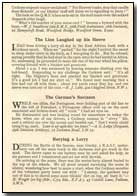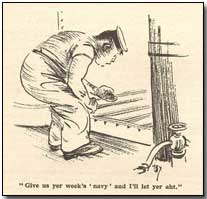Memoirs & Diaries - The Best 500 Cockney War Stories - The Lion Laughed Up His Sleeve and Other Stories
 Published in London
in 1921, The Best 500 Cockney War Stories
comprised, in the words of its newspaper publisher (The London Evening
News) "a remembering and retelling of those war days when laughter
sometimes saved men's reason".
Published in London
in 1921, The Best 500 Cockney War Stories
comprised, in the words of its newspaper publisher (The London Evening
News) "a remembering and retelling of those war days when laughter
sometimes saved men's reason".
The collection of short memoirs, some 500 in total, is divided into five categories - Action, Lull, Hospital, High Seas and Here and There. This page contains five stories from Lull, led by The Lion Laughed Up His Sleeve.
Other sections within the collection can be accessed using the sidebar to the right.
The Lion Laughed Up His Sleeve
I had been driving a lorry all day in the East African bush with a Cockney escort.
When we "parked" for the night I invited the escort to sleep under cover in the lorry, as I was going to do. But he refused, saying proudly that he had slept in the open since he had landed in Africa.
So, undressing, he proceeded to make the rim of the rear wheel his pillow, covering himself with a blanket and greatcoat.
About 1 a.m. I was awakened by hearing someone climbing over the tail-board. Responding to my challenge the Cockney said: "It's all right. The blighter's been and pinched my blanket and greatcoat. It's a good job I had my shirt on."
We found next morning that a lion had run off with them: about 100 yards away they lay, and one sleeve was torn out of the coat.
H. J. Lake, 40a Chagford Street, N.W.1
The Carman's Sarcasm
While our allies, the Portuguese, were holding part of the line to the left of Festubert, a Portuguese officer rode up on the most emaciated and broken-down old "crock" I had set eyes on.
He dismounted and was looking round for somewhere to tether the horse, when one of our drivers, a Cockney carman in "civvy" life, cast a critical eye over the mount and bawled out, "Don't worry abaht tying it up, mate. Lean it up agin this 'ere fence."
A. G. Lodge (Sergeant, 25th Division Artillery), 12 Derinton Road, S.W.17
Burying a Lorry
During the Battle of the Somme, near Ginchy, a R.A.S.C. motor-lorry ran off the main track in the darkness and got stuck in the mud. The driver came to our battery near by and asked for help, so six gunners and I volunteered and set out with shovels.
On arriving at the scene, there was the motor-lorry almost buried to the top of the wheels. We all stood around surveying the scene in silence, wondering how best to make a start, when the Cockney member of the volunteer party burst out with: "Lummy, the quickest way out of this is to shovel some more blinkin' dirt on top, an' bury it."
H. Wright (ex-Sig./Bdr., C/74 Bde., R.F.A.), 45 Colehill Lane, Fulham, S.W.6
Striking a Bargain
During the battle of the Narrows at the Dardanelles (March 18, 1915) I was in charge of No. 3 stokehold in H.M.S. Vengeance. The front line of ships engaged consisted of Irresistible, Ocean, Vengeance, and an old French battleship, the Bouvet. The stokers off watch were the ambulance party and fire brigade.
When the battle was at its height one of the fire brigade, a Cockney, kept us informed of what was going on, and this is the news we received down the ash hoist:
"Ocean and Irresistible 'as gorn darn, the Froggy's gone up in smoke: our blinkin' turn next. Pat, give us yer week's' 'navy' (rum ration) and I'll lift this bloomin' 'atch (armoured grating) and let yer aht!"
"Ajax," 23 King's Drive, Gravesend, Kent
Bugling in 'Indoostanee
After the evacuation of Gallipoli a transport was conveying British troops to Egypt. The O.C. wanted a trumpeter or bugler to follow him around during the daily lifeboat parade and to sound the "Dismiss" at the end.
The only one available was an Indian trumpeter, who had not blown a trumpet or bugle since 1914. He was ordered for the duty.
On the first day, immediately after the inspection was over, the O.C. gave orders for the trumpeter to sound the "Dismiss." After the trumpeter had finished, the O.C., with a look of astonishment on his face, gasped, "What's that? I never heard it sounded like that before."
Came a Cockney voice from the rear rank, "'E sounded it in Indoostanee, sir."
M. C., Surrey
Next - "For 'Eavens Sake, Stop Sniffin'!" and four other stories
"Coffin Nails" was a term used by British soldiers to describe cigarettes.
- Did you know?

